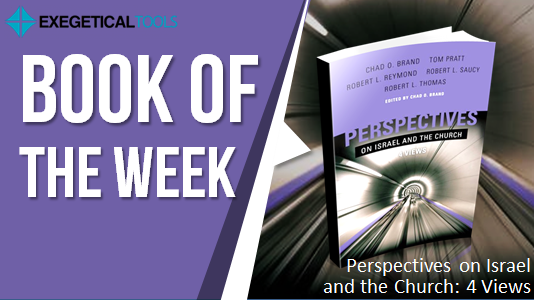Feel free to push back, but I dare say that the most important modern theological discussion is the relationship between Israel and the Church.
It all started in the early church: who were these “Christians?” Of course they were Jews, but by the end of the first century we had the famous “parting of the ways.” Christianity went the way of Ignatius while Judaism went the way of the rabbis. The Middle Ages bore rocky relations between the two, while modern times are stamped by the question of how Christians should relate to the renewed state of Israel. Aside from the political issue, there is the issue of Messianic Judaism and its relation to Christianity. And above all, there is the age-old question that Paul wrestled with in Romans 9-11: what of God’s special elect people, who have rejected the Messiah en masse?
Before we can settle any of these questions, the first and necessary step is to answer what is the relationship between Israel and the Church? How we answer this question will largely determine how we answer all the related questions. It largely drives our hermeneutic, our political stance toward Israel, and our approach to non-Messianic Jews today. That is why any book on Israel and the Church is so important.
When I learned about Perspectives on Israel and the Church: 4 Views, I was happy to see an entry-level book to the problem because I would have loved to have read this during my M.Div. years. It would have saved me the problem of being confused by the various hermeneutical approaches of my professors–some dispensational, some progressive dispensational, some progressive covenantal, and some classical covenantal. I had all four of these approaches taught to me during my M.Div., and I would have been spared much confusion had I understood that these professors were all just teaching me out of four different theological systems.
In this helpful book, editor Chad Brand provides a concise history of the church’s belief on this topic, from the early days of Ignatius through to Gentry and Wellum’s Kingdom through Covenant, which is the most recent major work in this area. This little introductory chapter is at least worth the Kindle price of the book, in my opinion (currently $9.99).
The four views are as follows:
- The Traditional Covenantal View by Robert Reymond
- The Traditional Dispensational View by Robert Thomas
- The Progressive Dispensational View by Robert Saucy
- The Progressive Covenantal View by Chad Brand and Tom Pratt, Jr.
Brand orders the chapters by the historical appearance of the view. The traditional covenantal view was spawned initially by Johannes Cocceius in the 17th century, but was not solidified until slightly later in the Reformed tradition. The traditional dispensational view arose in the 19th century and was given its classical exposition by Charles Ryrie in his Dispensationalism Today, while the progressive dispensational view arose in the twentieth century with its foundational treatment by Blaising and Bock. The order of these four chapters therefore takes you on a historical journey so you can see the way these positions have unfolded in response to the weaknesses of former positions.
The format of the book is typical of these sorts of works. Each author has about 50 pages to lay out their view, then the authors of the other positions make a brief response. The original author does not get a final response to the three critiques, which I probably prefer. Other books that allow a final rebuttal end up being too bogged down with details and repetition.
A good primer on the most important modern theological question.. Click To TweetIf you want to start thinking about the most important modern theological question, this is a great place to start. But even if you’ve thought about this question a lot, there’s still plenty to learn from these scholars who will bring the strongest of arguments for their positions. I’d recommend any seminary student and any pastor read this work, and even scholars could benefit from these concise treatments of each position.
Preview or buy it here.



